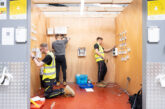
ECA poll finds increasing numbers of businesses see turnover rise following Brexit vote.
Over eight in 10 (80%) electrical and building services engineering firms say turnover increased or stayed the same during the third quarter of 2016, according to new survey findings from the Electrical Contractors’ Association (ECA).
The findings cover the three months from July – September, the period almost immediately following the landmark vote this summer for the UK to leave the European Union. The responses indicate that, overall, there was only a modest pre- and post-referendum impact on the sector.
Businesses of almost all sizes had a favourable third quarter, with small contracting firms, medium-sized enterprises and large organisations all reporting an improvement on the previous three-month period. However, micro businesses with turnover below £200,000 had a slight downturn in Q3.
“This ECA survey shows that electrical and building services firms remain broadly confident about their economic prospects, but we should remember that our sector feels any positive or negative effects later than many others in the supply chain.”
Looking ahead to the final quarter of 2016, the outlook is also positive overall, although business expectations are down, with 31% of firms expecting a rise in turnover in Q4 (a fall of 11% from expectations in our previous survey for Q3 this year).
ECA CEO, Steve Bratt commented: “This ECA survey shows that electrical and building services firms remain broadly confident about their economic prospects, but we should remember that our sector feels any positive or negative effects later than many others in the supply chain.
“In addition, the survey shows that the expectation for business is down for the final quarter of the year, and members are already reporting increasing prices of key materials and equipment. This means that 2017 may present even more challenges to profit margins.”
The Building Engineering Business Survey, which is held in association with Scolmore, was sent out to ECA members in early October this year. The response rate was the highest in five years.








